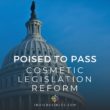SB 510: The Food Safety Modernization Act (PDF), introduced by Sen. Richard Durbin (D-IL), will likely soon become law. If passed, it will give the Food & Drug Administration (FDA) increased authority to inspect food manufacturers, processors, and packers. It would also create new provisions for suspension of food facilities that do not comply with certain reporting and monitoring requirements, and directs FDA to impose fees on manufacturers.
In addition to food, FDA also regulates cosmetics, and HR 5786: The Safe Cosmetics Act, contains provisions that would change the way cosmetics are regulated. (You can read more about that at the Oppose SCA Blog.) Senator Jon Tester (D-MT) is working closely with Senator Kay Hagan (D-NC) and Senator Jeff Merkley (D-OR), to include an amendment to protect local family-scale producers from provisions in the new law that would unnecessarily regulate them out of business. In this Congressional video, Sen. Tester outlines the basis for his belief that the amendment must pass.
His remarks are not unlike commentary I have shared at this blog that small and independent, family-owned manufacturers should not be regulated in the same way as large, multi-national companies are. Specifically, I said, “The main concern is with the potentially broad application of laws to tiny businesses where there have been no problems with the cosmetics they make, nor is there a foreseeable risk that there will be. The likelihood that any problem will be caused by tiny businesses is so low that the burdens associated with proposed laws, without exemptions for little companies, outweigh any benefits.” If you are a small manufacturer of anything in this country, it's worth watching this 5:56 minute video. If you don't have time to watch, you'll find a few of the highlights below:
Grow you soap and body care business with soap making equipment, tools, and supplies. Visit Soap Equipment for more information, and tell them dM sent you!
-
Don't blow local family-scale producers out of business.. Sen. Tester warned that, without the amendment, the Food Safety Bill would “blow local family-scale producers right out of business” by burdening them with expensive new federal regulations and time-consuming government paperwork. He also said that without an exemption, the new law would cost jobs.
Here's a direct quote at 1:15: “These folks are really folks that help build this country and undue regulation on them (and I do think it would be undue regulation) would simply stop a movement in this country that has gone on since this country's inception, but more recently, we've kind of gone back to it with locally produced foods.”
He pointed out that people who sell produce directly to consumers create desirable relationships that allow people to know exactly where their food comes from.
-
Consolidated, industrialized, and highly mechanized production is different.. Beginning at 1:37, Sen. Tester points out that small companies are different from large ones when it comes to how they manufacture products. He says we should not encourage that consolidation. “If we can get more locally grown food, if we can get producers to connect up with consumers, eyeball to eyebeall, that's a positive thing, and I don't want to diminish their ability to do this. My amendment really protects the ability for the farmer markets to flourish and provide food for people locally, without shipping it halfway around the world and back again.
This is a significant statement, and I believe one of the first in recent memory that recognizes that one-size-fits-all regulation of differently sized and operated businesses, even when they are in the same industry, is both unnecessary and counterproductive.
-
Pride of ownership.. At 3:05, Sen. Tester recognizes the pride small companies take in the products they make. Their small size complements and supports this pride of ownership, and translates into direct producer–to-consumer relationships that Sen. Tester believes must be preserved and encouraged.
At 3:13, he said, “They raise food, they don't raise a commoddity as happens when operations get bigger and bigger, and there's a direct relationship with that processor or that farmer that means a lot.” According to Tester, mistakes are rare, and when they happen traceability is immediate. It's far more complicated when it happens large companies that manufacture products on a grand scale.
If the amendment is included in the bill, it will protect small family-scale producers who sell mainly directly to consumers, local restaurants and retailers, and who gross less than $500,000 a year in sales.
The FDA maintains a listing of food safety recalls here, and you can sign up to receive safety alerts and recall announcements at that link.
Food And Cosmetics
There are some differences between food and cosmetics. First, cosmetics are not generally made with ingredients that the manufacturer grows in a field himself or herself. Additionally, unlike food, cosmetics are not now heavily regulated at the local level.
Having said that, the similarities are obvious and more important. In both cases, the products at issue are produced on an extremely small scale. Also, excessive and unnecessary paperwork adversely impacts safety by taking the manufacturers “out of the field,” as Sen. Tester put it. At 4:10, he said, “We don't want to throw undue paperwork on those folks. They don't have the ability to do it. It takes them out of the field to do that.” In the case of a cosmetics manufacturer, the field is the mixers, pots, and spatulas used to create the products.
Many small scale cosmetics companies sell their products “eyeball to eyeball” at local farmer's markets, right alongside the people who grow and sell the fresh fruits and vegetables, and the meats, cheeses, candles, herbs, flowers and other items sold at farmer's markets nationwide. And frequently, small scale cosmetics companies herbs, beeswax, honey and other ingredients from local producers.
Sen. Tester's remarks conclude with this statement at 5:31:
Allow the little guys to grow and employ people, and allow that economy to get bigger and better as time goes on.
Here! Here! My position is simple, and it has remained unchanged since 2008 when the first draft of new cosmetics legislation was introduced. Small companies should not be forced to deal with the same expensive regulations that are aimed at big industry scale producers. You can watch my video along these lines, from June 2008, at this link.
In My Home State
Other statements along these lines from North Carolina Senators, as reported in the Winston-Salem Journal last week:
“Because most contamination problems come from large farms and grocery- store chains, which may have difficulty tracking just where a batch of lettuce or a bushel of tomatoes came from, it makes sense to tailor the legislation and exempt farmers who sell directly to customers.” Sen. Kay Hagan (D-NC)
“Any final food-safety bill must not be a “one-size-fits-all' approach,” Burr said in the statement. “I will continue to work to include key provisions for small processors and farms.” Sen. Richard Burr (R-NC).
It is not insignificant that similar concerns are being addresses by elected officials on both sides of the aisle. I am very encouraged by this development, and encourage you to read local papers in your state to find similar statements by your elected officials. If you come across any, please let me know in the comments.
Question: What do you think of the proposed amendment? Do you think a similar exemption should exist for small cosmetics manufacturers? Why or why not?



